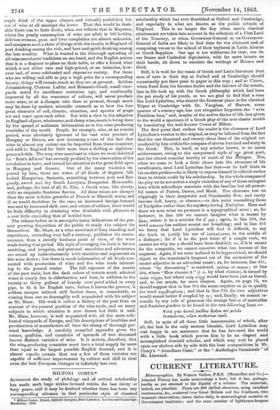MILTONI COMUS.•
ALTHOUGH the study of philology and of critical scholarship has made such huge strides forward within the last thirty or forty years, still it may be doubted whether there has been any corresponding advance in that particular style of classical • Milicai Comas. Grace, reddidit Georgius,13aro Lyttelton. London and Cambridge: 11110311114111. 1863.
scholarship which has ever flourished at Oxford and Cambridge, and especially in what are known as the public schools of England. This is no longer the day when men's classical attainments are taken into account in the selection of a First Lord of the Treasury, or when Governors-General or ex-Governors- General of India are likely to find time for the dilettanti task of composing verses to the school of their boyhood in Latin Alcaics or Greek Sapphics. Our age is too utilitarian for that ; nor do our Deans and Cathedral dignitaries, with far more leisure on their hands, sit down to emulate the writings of Horace and Ovid.
Still, it is well for the cause of Greek and Latin literature that men of note in their day at Oxford and at Cambridge should occasionally put their pens to paper in this way ; and as Cicero, when freed from his forensic duties and the labours of the senate, late in life took up with the Greek philosophy which had been
the pet study of his youth, so we are glad to find that a man like Lord Lyttelton, who shared the foremost place in the classical Tripos at Cambridge with Dr. Vaughan, of Harrow, some quarter of a century ago, has not altogether forgotten the " avia Pieridum lees," and, in spite of the active duties of life, has given to the world a specimen of a Greek play of the true classic model by translating the well-known Comas of Milton.
The first point that strikes the reader is the closeness of Lord
Lyttelton's version to the original, as maybe inferred from the fact that the one thousand and twenty-three lines of the original are rendered by him within the compass of eleven hundred and sixty in the Greek. This, in itself, as any scholar knows, is no mean achievement, owing to the compressed style of our great poet, and the almost oracular brevity of much of the galogue. Nor, when we come to look a little closer into the structure of his versification, need Lord Lyttelton fear that—as he half hints in his modest preface—he is likely to expose himself to ridicule rather than to obtain credit by his scholarship. In the whole compass of the play we do not notice a single violation of any of those stringent laws which schoolboys associate with the familiar but all-power- ful names of Person, Dawes, and Monk. The choruses run on trippingly in their Anapaestic and Choriambic flow, and rarely become dull, heavy, or obscure, in this point resembling those of Euripides rather than the mystery-loving Alschylus. Here and there we note what we presume is a typographical error ; as, for instance, in line 299 we cannot imagine what is meant by ithsv, unless it be a mistake for rj ; again, in line 319, the word atriums' has neither accent nor breathing ; and in line 317 we fancy that Lord Lyttelton will find it difficult, to say the least, to justify his use of iprizxXeIrroy in the middle of a dialogue ; for if it be the past tense of a simple verb, we cannot see why the z should have been doubled; or, if it is meant for the composite, we cannot conceive what has become of the augment. Again, if we were inclined to be hypercritical, we should object to the translator's frequent use of the accusative of the neuter adjective in an adverbial sense ; as, for instance, line 837, where "by discourtesy" is rendered, rpiorwv 14 axe:troy; or line 594, where "How chance it" (i. e., by what chance), is turned by /roiccr vi,xev, but where avicp rIfixp would have been just as literal, and, to our minds, far more elegant. Again, on page 75, we should suggest that in line 704 the sense requires an 121/ to qualify the word wspi43X4Aivra ; and that in line 712 the two adjectives would sound better if coupled by re ; and, finally, we cannot re- concile by any rule of grammar the strange fusion of masculine and feminine genders to be found in the two following lines :— 11"/Xir ydp duroii pagbov el' papa ad pac"..i kg-tot-brat, yelipa ezoapaigdy looD.
Still, in spite of all these little inaccuracies, of which, after all, the last is the only serious blemish, Lord Lyttelton may rest happy in our assurance that he has favoured the world with a little book which proves him to be an elegant and accomplished classicial scholar, and which may well be placed upon our shelves aide by side with the best compositions in Mr. Drury's " Arundines earth," or the " Anthologia Oxoniensis of Mr. Linwood.






























 Previous page
Previous page